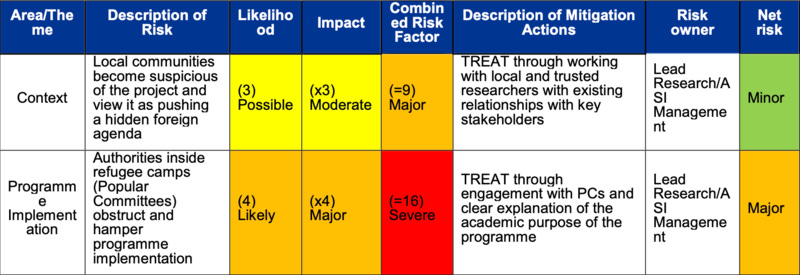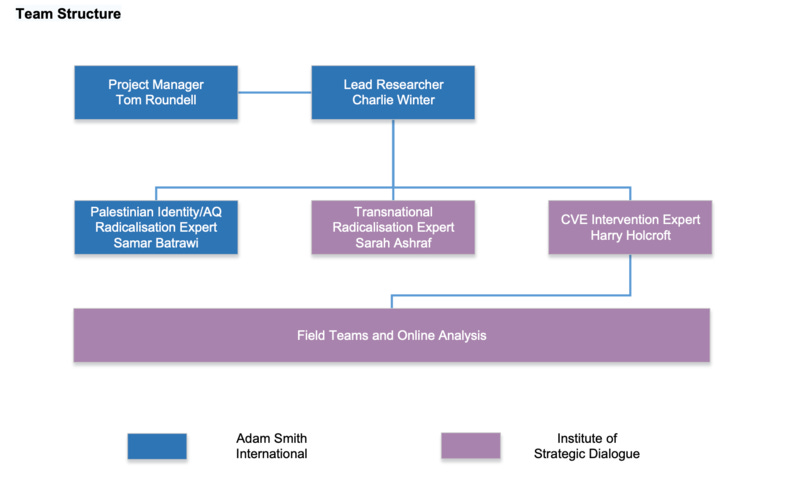
Originally published by The Electronic Intifada.
By Asa Winstanley and Kit Klarenberg, 1 February 2023

A cache of leaked documents obtained by The Electronic Intifada reveals the existence of a secret British intelligence project targeting Palestinian refugees.
Under the pretext of “academic purpose,” a consortium of shadowy intelligence contractors agreed to conceal their ties to the British Foreign Office, for the apparent purpose of surveilling and manipulating Palestinians.
The group masquerading as researchers planned to interview residents of Palestinian refugee camps in Jordan, Lebanon and the occupied West Bank as part of a British government initiative that was to be run out of the UK consulate in occupied East Jerusalem.
The project aimed to monitor “criticism of Western and Israeli foreign policy.”
In a leaked risk assessment, the contractors emphasized “the importance of ensuring confidentiality around the sources of funding and the aims of the program.”
They did so to mitigate the risk Palestinians in the refugee camps would “become suspicious,” or camp leaders would “obstruct and hamper” the project, the risk assessment states.
You can read extracts from the leaked cache throughout this article, and in PDFs attached at the end.
At the same time, the contractors emphasized the need to gain the trust of their targets through “Regular and inclusive, engagement with local partner organizations, formal and informal authorities, youth and other stakeholders” in order to “create or reinforce buy-in and ownership of the project.”
But given that Palestinian refugees would not be told the real aims and objectives of the project they were expected to support, it would appear that the deception was a cover for British intelligence gathering.
The consortium was led by private intelligence contractor Adam Smith International, or ASI. The Institute for Strategic Dialogue, an “extremism” think tank, was also involved.
According to the documents, ISD planned to “leverage its relationships and access in the region to undertake interviews with ‘Former Fighters’ who have joined local and international violent extremist groups.”
ISD is funded by the British, US and various European governments, as well as by the European Union.
Among its “partners” are two major Israel lobby groups that engage in anti-Palestinian propaganda, the Anti-Defamation League and B’nai B’rith International – though there is no indication these groups were involved in this project.
ISD did not respond to a request for comment.
ASI declined to comment on the documents, saying that, “Queries regarding any particular project should be directed to the” British foreign office.
But one of the ASI researchers named in the leaks confirmed the project went ahead.
The stated aim of the project was to “counter” the “violent extremism” of groups such as ISIS and al-Qaida.
A leaked Foreign Office document setting out the requirements for the project says the findings would be used to improve targeting of subsequent “Countering Violent Extremism” (or CVE) “interventions” in the region, identifying “what types of intervention are most likely to be successful.”
However, the documents show it was primarily aimed at helping British government entities develop a better understanding of “the extent to which Palestinian issues, and narratives about Palestinian issues” were a “driver of radicalization.”
The requirements document specifies that it was part of the UK government’s “Conflict, Stability and Security Fund” which was worth $10.5 million that year.
A provisional budget of $120,000 was allocated to the project, according to the document.
The project ran from October 2018 until March 2019.
The ASI’s claim to be “countering” al-Qaida is undermined by its record of support for the group’s affiliates in Syria.
British government funding to one ASI project in Syria was halted soon after a 2017 BBC TV program exposedevidence that the contractors were funding and aiding al-Qaida.
Sensitive to the possibility of more bad publicity, the author of the leaked risk analysis for the Palestine project lists “inadvertently support[ing] terrorist or proscribed groups” as one of the program’s “moderate” risks.
The ASI-led consortium proposed a study using in-person interviews in the camps combined with “social listening” technology to monitor social media and other online discussion.
“Analysis will be conducted on which narratives are dominant,” their proposal explains. It aimed to ascertain whether “identity issues, criticism of Western and Israeli foreign policy, or ideology, receive the most engagement.”
It boasts of “a research team of highly specialized young researchers who are at the cutting-edge of the growing field of Daesh [ISIS] and Al-Qaeda analysis.”
It promised that “the research team will [do] an assessment of where the risk of radicalization around the Palestinian issue is most severe.”
According to a leaked collection of resumés, assembled to support the bidding process, the project team included Samar Batrawi – a Dutch Palestinian researcher, member of Palestinian think tank Al-Shabaka and former visiting fellow at Birzeit University in the occupied West Bank.
Batrawi is described in one of the documents as ASI’s Palestinian identity and al-Qaida expert.
The team was to be led by Charlie Winter, an “extremism” researcher.
Winter has “extensive experience providing bespoke research services to governments, militaries, and private sector organizations,” his resumé states.
He was also once a senior researcher for Quilliam, a now defunct British think tank widely regarded by the Muslim community as Islamophobic, and which was founded by British intelligence.
Batrawi’s resumé states she has “undertaken extensive primary research including interviews with AQ [al-Qaida] extremists” and has conducted interviews “in Arabic with key policymakers in the Palestinian Authority, its security forces, and non-state armed groups in the West Bank and Gaza.”
The resumé of Sarah Ashraf, a third member of the team, touts 10 years of experience with “sensitive material with regards to insurgency, counter-insurgency, extremism, transnational jihadism and ideological underpinnings of various forms of radicalism.”
The documents state that Batrawi, Winter and Ashraf were “responsible for conducting the research and writing the final deliverable.”
They also boast of access to “two archives of Salafi-Jihadi propaganda maintained by Charlie Winter and Samar Batrawi.”
Harry Holcroft, a fourth member of the team, is named as the group’s “CVE Intervention Expert.”
Holcroft is described as having “well-developed networks across government, development, security and civil society sectors” and having gained a first class degree in Arabic with Persian.
He has also managed “closed research projects on the intersection of extremism and Palestinian issues for HMG [Her Majesty’s Government].”
Deleted profiles of Holcroft formerly on the Institute for Strategic Dialogue’s website state that he spent years “living and working across the region in Syria, Egypt, Qatar and Oman” and “has managed primary research in multiple geographies, including over 60 Former Foreign Terrorist Fighters.”
Holcroft also worked for the British embassy in Cairo and for Bell Pottinger, a notorious British lobbying firmthat was shut down after its role in stoking racial tensions and disseminating false information caused a national scandal in South Africa.
Winter and Ashraf did not respond to requests for comment. Holcroft could not be reached for comment.
Palestinian researcher distances herself
In responses emailed to The Electronic Intifada, Batrawi confirmed her involvement in the Adam Smith International project.
But she said she didn’t travel to Palestine or interview Palestinians, was “mainly involved at the beginning (the background research phase)” and has “since distanced myself from it.” She also denied any involvement in the final report.
Batrawi said of her involvement: “I believed that – as a Palestinian – my perspective on these issues could change these discourses/policies from within. This is no longer something I believe.”
She said her main tasks were to draft a background paper, provide feedback on a questionnaire that would be conducted in Palestine by ISD and to connect ISD with locals who could set up focus groups.
But on the last point, Batrawi said that “I was not able to do this.”
She also denied interacting with the British Consulate during the operation, and said she was unaware Palestinian interviewees were not informed of the British government role.
But Batrawi will undoubtedly be aware that her Palestinian identity and her knowledge and research on Palestinians were emphasized as selling points in the Adam Smith International proposal bidding for the British government contract.
A budget in the leaked documents allocated $12,000 to pay Batrawi for her role. Winter was to receive around $30,000, Ashraf $8,000 and Holcroft $10,000.
Batrawi said she was actually paid just over $8,000 for 14 days of work.
“Close collaboration” with British consulate
In their leaked proposal, the contractors pledge to work in “close collaboration” with the British Consulate in Jerusalem.
The consulate is an important base of operations for MI6, Britain’s overseas spy agency.
Britain’s CVE programs are part of its controversial “Prevent” strategy, which successive governments have claimed helps counter terrorist attacks.
But faith groups have repeatedly condemned Prevent as Islamophobic, due to how it renders Britain’s entire Muslim community suspect on the basis of religion and ethnicity.
Public records related to the Foreign Office’s multi-million-pound “Middle East Peace Process” program, from which the secret project revealed in the leaked documents was financed, state that the initiative is motivated by the “high risk of instability” in the occupied West Bank and Gaza.
“Potential overspill of violence into Israel” and, in particular, “terrorist attacks against Israelis,” are specifically cited as eventualities London intends to preemptively stop through a variety of clandestine operations.
These records also explain the program is aimed at halting the “continued decline of public confidence and support for a negotiated solution” among Palestinians.
The program is wrapped in the justification that Britain wants to “protect the political and physical viability of a two-state solution,” but it aims to do so by manipulating Palestinians rather than by ending British support for Israel’s occupation and theft of Palestinian land.
Far from preventing “radicalization” by resolving legitimate Palestinian grievances against Britain and Israel, the Foreign Office seemingly wants to neutralize legitimate anger at brutal injustice via covert propaganda initiatives.
These propaganda narratives delegitimize reasonable condemnation of Israel’s settler-colonial barbarity, while falsely depicting Palestinian resistance as an equal contributor to violence and instability in the region.
Funding al-Qaida
Adam Smith International describes itself as a “global advisory company,” and has reaped hundreds of millions of dollars from Foreign Office contracts.
As noted, Adam Smith International has previously been embroiled in scandal. In 2017, an investigation by the BBC’s Panorama program revealed that ASI handed over British government funds to extremist groups in Syria, including members of Nour al-Din al-Zinki (a CIA-vetted and al-Qaida linked group which in 2016 infamously beheaded a child alleged to be a Palestinian fighter aligned with the Syrian government).
The money was provided as part of a project, run by Britain and five other Western governments, to fund the so-called Free Syrian Police.
ASI documents obtained by Panorama showed the contractor was aware 20 percent of all police salaries were being handed over “to pay for the military and security support that Zinki provides to the five FSP stations located [in] areas under its control.”
ASI at the time denied these findings. Yet in a statement to Panorama, it admitted to having funded extremists, claiming this was a mistake that was later rectified.
Panorama also uncovered evidence that Jabhat al-Nusra – the Syrian branch of al-Qaida – handpicked some of the “Free Syrian Police.” The program moreover found the force provided support to “courts” managed by al-Qaida in some areas, including one case where a woman was stoned to death in the presence of FSP members for violating al-Nusra’s theocratic codes.
The force backed by Adam Smith International even closed the road to allow the execution to take place.
After the Panorama episode – “The Jihadis You Pay For” – aired in 2017, the British government suspended funding to the ASI project and launched an investigation.
The following year it quietly ended the scheme and the Free Syrian Police disbanded altogether in 2019.
Yet despite the scandal, the leaked cache shows that ASI has continued to tout the Syria scheme as evidence of its suitability to take on more British government projects.
The proposal for the project on Palestine lists ASI’s “Access to Justice and Community Security” scheme in Syria as one of its successes.
“AJACS has worked in Syria to identify and support community leaders,” the proposal claims, saying the project provided “support for moderate opposition institutions.”
“Radicalization”
The bid documents do not offer any definition of “extremism” or “radicalization” – meaning these terms can be easily weaponized against almost anyone.
Prevent has come under sustained criticism in the past. In 2015, a Prevent pamphlet listed “showing a mistrust of mainstream media reports … belief in conspiracy theories [and] appearing angry about government policies, especially foreign policy” as potential warning signs of “radicalization” in schoolchildren.
As The Electronic Intifada has documented for many years, campaigning for Palestinian rights is considered a sign of potential “radicalization” and a propensity towards “violent extremism” under Prevent.
The consortium promised to “leverage its relationships and access in the region” to conduct interviews with former members of “local and international violent extremist groups,” gathering further intelligence on the question.
Deceiving Palestinian interviewees, and the Popular Committees governing refugee camps, as to the true nature of the initiative in which they were engaged was apparently of paramount concern.
“Hidden foreign agenda”
The consortium forecast that “local communities [becoming] suspicious of the project and [viewing] it as pushing a hidden foreign agenda,” and Popular Committees working to “obstruct and hamper” the program, were both major risks.
The risk assessment states these dangers could be overcome using “local and trusted researchers” as cutouts, and publicly framing the project as purely “academic” in nature.
There is no evidence to suggest the British government’s “CVE” approach is remotely effective in countering al-Qaida-style violence, or that holding or being exposed to “radical” viewpoints necessarily leads to violence in any case.
While small al-Qaida and ISIS-style cells have briefly flourished in the Gaza Strip, the ruling Hamas government has always succeeded in swiftly dismantling them.
There’s no indication of widespread sympathy for such extremist entities among Palestinians either within or outside the occupied territories.
Like all other armed Palestinian groups, Hamas is essentially a national liberation movement. Its ideology is alien to the violent extremism of transnational jihadist groups like al-Qaida and ISIS.
Questions must be asked, therefore: Was the true purpose of this British government project more about spying on Palestinians, and manipulating public opinion about Israel, as part of its so-called “interventions”?
And given ASI’s record of support for al-Qaida in Syria, if the British government was so concerned about ISIS and al-Qaida, why did it even invite ASI to bid on this “research” contract in the first place?
Asa Winstanley is an investigative journalist and associate editor with The Electronic Intifada. Kit Klarenbergis an investigative journalist exploring the role of intelligence services in shaping politics and perceptions.
To read some of the full documents mentioned in this piece, see the PDFs attached to the end of the original story over at The Electronic Intifada.
 RSS Feed
RSS Feed















 February 3rd, 2023
February 3rd, 2023  Awake Goy
Awake Goy 


 Posted in
Posted in  Tags:
Tags: 













